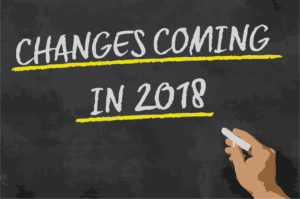Remote Seller Resources
Comprehensive list of resources for remote sellers following the South Dakota v. Wayfair Supreme Court decision – including state notices, videos, articles, training opportunities, and more.
Sales and use tax is always evolving.
It evolves to keep up with new industries, to meet the changing needs of a state, or one of countless other factors. It’s a complex thing. And that means we’re always on the lookout for new sales tax trends across the states.
2018 is certainly no exception. There is already a long of list of new legislative changes that could potentially have a significant impact on your company’s operations. And if you’re responsible for sales and use tax at your company, you should be aware of the big changes that are taking place so you can account for them and minimize your potential risk.
Here at the Sales Tax Institute, we track the sales tax changes that are taking place in 2018 to keep you informed. Today, we’ll break down what the change means for you and what we think these changes indicate for the future of sales tax.
Here are 3 of the biggest, most important sales tax developments that could have an impact on your company in 2018:

If you or your company make online sales, remote seller nexus legislation should be at the top of mind. States enacting legislation that targets remote, out-of-state sellers (such as internet retailers) was huge in 2017 and we expect the trend to continue and expand in 2018.
Among the different types of remote seller nexus legislation, the three types that are being enacted most frequently lately are economic nexus, marketplace nexus, and notice and reporting requirements.
Numerous states have enacted legislation that became effective January 1, 2018 or whose requirements take effect in early 2018. It’s a lot to keep track of, and with states rushing to capitalize on this significant revenue stream, we fully expect more states to continue introducing and enacting these types of legislation in 2018.
With the U.S. Supreme Court accepting the South Dakota v. Wayfair, Inc. case, this will be an exciting year. Twenty six years have passed since the High Court has ruled on nexus. We will be monitoring and tracking the activities and how this could impact what the states do while they are waiting for a decision.
So what can you do to stay on top of the new changes? For starters, bookmark our Remote Seller Nexus Chart, where you can keep track of which states have enacted legislation along with the effective date of the legislation.
Sales tax administration may seem like a mundane topic, but that doesn’t negate how important it is to do it right. States frequently enact changes to sales tax administrative requirements, such as how taxpayers are required to file their taxes.
Two states (Illinois and Arizona) have enacted changes to their electronic filing requirements for sales and use tax filers, effective January 1, 2018. Big deal, right? Well actually, this sort of thing is really important. Penalties can be pretty stiff for non-compliance.
For example, per the Illinois legislation, if a taxpayer is required to file electronically and does not, numerous discounts and collection allowances for timely filed and paid returns will be disallowed. With a collection allowance of 1.75%, a loss of this is significant.
Arizona’s legislation specifies that failure to comply with the electronic filing requirements could result in the assessment of penalties.
So neglecting to keep up with changes to administrative requirements can easily lead to money flying out the door when it doesn’t have to. Stay informed with the requirements of your state, make sure you’re in compliance with sales tax administrative changes, and you’ll bring cost savings to your company.
Tax amnesty programs are fantastic for companies but are frequently underutilized. They are one of those rare opportunities that states give to taxpayers to really help them out.
We’ve seen tax amnesty situations that have literally saved a company from going under!
As states crack down on collection, they also tend to introduce an amnesty program to help companies get ahead of a bad situation. 2018 is no different.
Numerous states have enacted tax amnesty programs that are running this year. And more may do so throughout the year. So what is the benefit to taxpayers? If you are required to collect and remit sales tax in a state and have neglected to do so, tax amnesty programs typically offer some terrific benefits – sometimes including full back tax forgiveness.
Ohio’s current tax amnesty program, which is running from January 1, 2018 to February 15, 2018, is available to eligible businesses and individuals that have unreported or under-reported taxes that were due and payable prior to May 1, 2017. For taxpayers who fully pay qualifying tax delinquencies through the amnesty program, the state will waive all penalties and half of the interest normally charged.
That’s a big deal! Tax amnesty programs can help taxpayers get compliant, get penalties and interest waived on outstanding tax liabilities, and provide peace of mind. Keep an eye out for tax amnesty programs in 2018 – you can start by bookmarking our Sales Tax Amnesty chart and checking back regularly.
 About the Author:
About the Author:Diane L. Yetter is a strategist, advisor, speaker, and author in the field of sales and use tax. She is president and founder of YETTER Tax and founder of the Sales Tax Institute. You can find Diane on LinkedIn and Twitter.